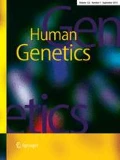Abstract
Recent reports on a potential association between the K-variant of the gene for butyrylcholinesterase (BCHE-K) and Alzheimer’s disease (AD) are discordant. An initial finding of association through a synergistic enhancement of risk of APOEɛ4 with late-onset AD has not been confirmed by others. We have conducted a case-control study of histopathologically confirmed AD (n=135) and non-AD (n=70) cases (age of death ≥60 years), in which we have genotyped for APOEɛ4, BCHE-K, and BCHE-A1914G, a silent polymorphism 299 bp downstream of the BCHE-K mutation. The allelic frequency of BCHE-K was 0.13 in the controls and 0.23 in the AD cases, giving a carrier odds ratio (ORc) of 2.1 (95% C.I. 1.1–4.1) for BCHE-K in confirmed AD. The allelic frequency for the BCHE-1914G variant was 0.19 and 0.33 in controls and AD cases, respectively (ORc=2.4; 95% C.I. 1.3–4.5). In an older sub-sample of 27/70 controls and 89/135 AD patients with ages of death ≥75 years, the ORc was increased to 4.5 (95% C.I. 1.4–15) for BCHE-K and 2.7 (95% C.I. 1.0–7.2) for BCHE–1914G carriers. The BCHE-K association with AD became even stronger in carriers of at least one APOEɛ4 allele. Only three out of 19 controls compared with 39/81 AD cases carried BCHE-K in addition to APOEɛ4, giving an odds ratio of confirmed AD of 5.0 (95% C.I. 1.3–19) for BCHE-K carriers within APOEɛ4 carriers. Five out of 19 controls and 52/81 AD cases carried BCHE-1914G, giving the same odds ratio of confirmed AD of 5.0 (95% C.I. 1.6–16) for BCHE-1914G carriers within APOEɛ4 carriers. In addition, our results suggest strong linkage disequilibrium between BCHE-K and BCHE-1914G but no major association of the sole BCHE-1914G chromosome with AD. We conclude that BCHE through its K-variant, rather than a nearby marker, is a susceptibility factor for AD and enhances the AD risk defined by APOEɛ4 alone in an age-dependent manner.
Similar content being viewed by others
Author information
Authors and Affiliations
Additional information
Received: 29 September 1998 / Accepted: 29 December 1998
Rights and permissions
About this article
Cite this article
Wiebusch, H., Poirier, J., Sévigny, P. et al. Further evidence for a synergistic association between APOEɛ4 and BCHE-K in confirmed Alzheimer’s disease. Hum Genet 104, 158–163 (1999). https://doi.org/10.1007/s004390050929
Issue Date:
DOI: https://doi.org/10.1007/s004390050929




